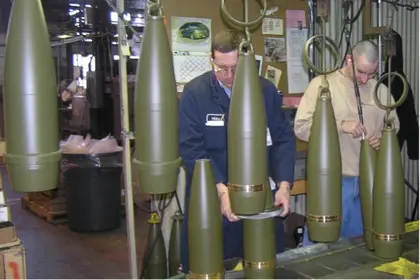Supplying large amounts of artillery munitions to Ukraine has taught the US it needs to speed up its weapons production to be ready for future military contingencies, including provisions for its allies.
Douglas Bush, US assistant secretary for acquisition, logistics and technology for the Army told a media roundtable in August that US production of 155mm artillery shells has almost doubled from its prewar totals of 14,000 rounds a month. He said that this was only the beginning with their aim to be double again in the coming year and to hit a million rounds a year, or more than 80,000 a month, by 2025.
JOIN US ON TELEGRAM
Follow our coverage of the war on the @Kyivpost_official.
When questioned why it had taken so long to ramp up production rates for artillery shells, Bush said that the US Army was establishing entirely new production lines for shell bodies, the triple-base propellants that launch the projectiles and its capacity to acquire high explosives to load into shells.
“What takes the longest is acquiring and installing the machine tools and the machinery that makes the explosives and things like that,” Bush said.
Gabe Camarillo, Under Secretary of the US Army, confirmed Bush’s figures and said the Army had spent $1.45 billion on capacity building in the current financial year and had budgeted for $2.5 billion in FY23.
Marion Whicker who has responsibility for materiel life cycle management in the US Army Materiel Command said the US has a strategy to invest $18 billion on modernization of its ammunition plants in the next 15 years.

‘Fiscal Steroids Are Wearing Off’ – Biden’s Sanctions on Russia Bear Fruit Just as He Is Set to Leave
According to a July Defense Department statement the US has provided more than 2 million 155mm artillery shells from held stocks since Russia’s full-scale invasion, which, according to former Undersecretary of Defense for Policy Colin Kahl, led to President Biden approving the delivery of cluster munitions to serve as a temporary solution until sufficient standard general purpose 155mm could be produced.
The need to accelerate artillery manufacture so drastically is three-fold.
Firstly, it’s to ensure that Ukraine can receive sufficient artillery munitions from the US and its NATO allies to successfully conduct its war.
Secondly, it is necessary to replace the US stocks that have already been expended.
Thirdly, there is a realization that war planners had focused too much on the type of low-intensity conflict of the lats thirty or more years and forgotten the threat from the type of general war occurring in Ukraine.
The war against Russia has shown that the stock levels currently held by the US and others is simply insufficient to sustain the actual usage rates.
In this context Bush was quoted as saying “There’s a lot of support [for ammunition].
“We’re working through our allies to help make sure Ukraine is supplied. So, it’s not all the United States, and I think that’s a success story. The United States is the arsenal of democracy, but we can have multiple arsenals in other democracies, and we have those, and they’re helping.”
The Sept. 5 edition of the defense news publication Task & Purpose said that even at the increased rates currently planned it will take years to replace and supplement 155mm artillery ammunition to the quantities needed.
It also points out that the need for such enhancement is necessary across all types of shells, rockets, and missiles that the US military badly needs now.
It says that the war in Ukraine has shown that the US “would need a gigantic amount of munitions to fight a war against China or Russia.”
You can also highlight the text and press Ctrl + Enter










